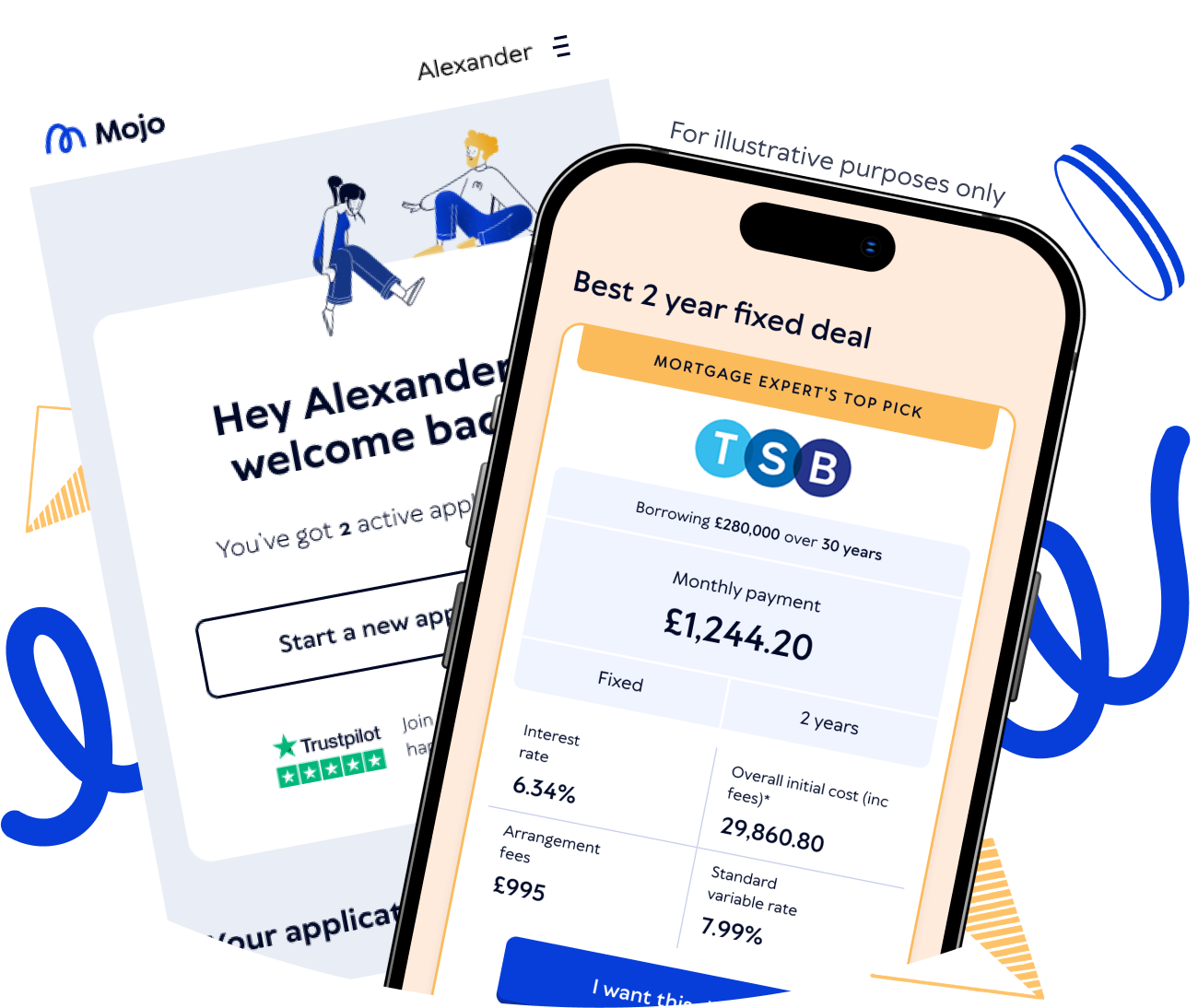Should I choose a fixed or variable mortgage?
Trying to plan out how your monthly mortgage payments might look? Think about whether you want predictable payments that stay the same each month, or if you're comfortable taking more of a risk with interest rates.
Let’s take a look at the pros and cons of both fixed and variable-rate mortgages.


A quick summary:
The type of mortgage you choose really can impact your monthly budget, so it’s crucial to consider all available options
A fixed-rate mortgage offers an interest rate that remains constant, whereas a variable-rate mortgage's rate can change
This means your monthly payments will be consistent with a fixed rate, but they may fluctuate with a variable rate.
The mortgage market is volatile at the moment, so there are no guarantees whether rates will go up or down in the near future. This makes it challenging to know whether fixing your interest rate will be the most cost-effective option in the long term
Ultimately, the decision between a fixed or variable mortgage comes down to whether you personally value stability versus flexibility
The difference between a fixed and variable-rate mortgage
As the name suggests, a fixed-rate mortgage means the interest rate you pay remains fixed throughout the duration of your deal whereas with a variable-rate mortgage your interest rate can fluctuate.
Fixed-rate mortgage | Variable-rate mortgage |
|---|---|
A fixed-rate mortgage has the same interest rate for a specified deal length. This means your monthly mortgage payments will stay the same for that period of time, no matter what happens to mortgage rates. You can choose the length of time you’d like to lock in the deal length for, though different introductory periods carry different rates. At the end of the fixed-rate period, you’ll be automatically moved onto your lender’s standard variable rate (SVR) unless you choose to remortgage at the end of your fixed-rate deal. | With a variable-rate mortgage, your repayments can change regularly as the interest rate you pay rises or falls in-line with an indicator chosen by your lender (usually the Bank of England base rate). There are three main types of variable rate: tracker, discount and standard variable rates (SVR). Tracker and discount mortgages have an introductory period that comes with cheaper rates, whereas a lender’s SVR does not. This makes it one of the most flexible mortgage types, though also one of the most expensive. |
95% of our mortgage applicants opt for a fixed-rate deal
95% of our mortgage applicants in the third quarter of 2025 opted for a fixed-rate deal, with just 5% choosing a tracker mortgage*.
The choice between a fixed or variable-rate mortgage really does depend on your personal preference and what’s going on in the mortgage market at the time. For many, the security of a fixed-rate mortgage seems to be the priority.
Advantages of a fixed-rate mortgage
-
Payment predictability. Your payments will stay the same throughout the deal period, helping you to manage your budget
-
No worrying about mortgage rates. While it’s always a good idea to keep an eye on the mortgage market, changes in the base rate or lender interest rates won’t impact you at all until your deal ends
-
Take advantage of low rates. If you take out a fixed-rate mortgage when rates are low, you’ll be protected against interest rate rises for the duration of your deal
Disadvantages of a fixed-rate mortgage
-
It can be expensive to leave a fixed-rate deal. You face paying significant early repayment charges if you want to remortgage before your deal ends
-
You could miss out on cheaper rates. If interest rates fall, you won’t benefit until your deal ends or you decide to switch mortgages (though you’ll need to make sure paying hefty ERCs doesn’t outweigh the benefits!)
Advantages of a variable-rate mortgage
-
Potential for lower monthly payments. If rates decrease, so do your monthly payments
-
Cheaper to begin with. Variable-rate mortgages may offer lower introductory rates - but remember the interest rate could change at any time
-
Greater flexibility. Variable-rate mortgages often have lower early repayment charges and more generous overpayment thresholds. Or, if you opt for your lender’s standard variable rate, you likely won’t face any restrictions at all
Disadvantages of a variable-rate mortgage
-
Risk of increased repayments. If rates rise, you’ll be left facing higher monthly payments
-
Harder to budget. There’s no way of predicting or guaranteeing when rates may rise or fall, which can be stressful.

“Comparing the rates available for both fixed and variable mortgages can help you to make an informed choice. We’ll compare deals from over 60 lenders - checking not just rates but also terms and fees to make sure the product we recommend has the features you’re looking for.”
Luke Butcher, Chief Revenue Officer
Fixed or variable-rate mortgages: which is cheaper?
At the moment, fixed-rate mortgage rates are slightly cheaper compared to variable-rate options.
Mortgage type | Average rate |
|---|---|
2-year fixed-rate mortgage (75% LTV) | 4.75% |
5-year fixed-rate mortgage (75% LTV) | 4.98% |
2-year variable-rate mortgage (75% LTV) | 4.54% |
Average standard variable rate | 7.60% |
All average rates are provided by Mojo Mortgages. The above are the average mortgage rates for various products across the market on 6 October 2025. These won't necessarily be available to you, and are not the only product types available.

Find a deal that’s right for you
We work with first-time buyers, home movers, those looking to remortgage and buy-to-let landlords to help homeowners find the right mortgage for them.
Get free expert advice and support
Compare fixed-rate and variable mortgage deals
We have access to 70+ lenders with exclusive products available
Here’s what you need to consider when deciding whether to go for a fixed or variable mortgage
-
What’s your comfort level when it comes to risk? If varying rates - and therefore monthly payments - don’t bother you, a variable-rate mortgage could end up saving you money (but there are no guarantees)
-
Do you have financial wiggle room? Variable-rate mortgage payments can change at any time so, if you’re not confident you could manage increased repayments, you may prefer a fixed-rate option so you know exactly how much you need to budget for each month.
-
Are mortgage rates likely to go down soon? If you believe mortgage rates are likely to decrease, you won’t feel the benefit if you lock in a potentially higher fixed-rate deal.
-
How long should I fix for? Though it’s more common to talk about how long you’ll lock in a fixed-rate mortgage for, if you’re looking for a tracker or discount mortgage you’ll need to decide on how long you want the initial period to be too.
-
Are you expecting a change in circumstances? If you’re planning to move home soon, it might not make sense to lock in to another fixed-rate deal. Instead, selecting a product with no (or low) early repayment charges might be more cost-effective even if it does come with slightly higher rates. Similarly, if you’re hoping to repay your mortgage, the cost of remortgaging might outweigh the costs of falling onto your lender’s standard variable rate for a short period of time.

“Remember, you can choose your deal length so you’re not locked in to one mortgage type for the lifetime of your loan. Choosing a shorter deal can give you the option to reassess your circumstances, market conditions and interest rates in just a few years’ time. You’ll need to factor in remortgage fees, though, so it really is about choosing the option that gives you the most reassurance.”
John Fraser-Tucker, Head of Mortgages
FAQs
Yes, it’s always possible to switch from a variable to a fixed-rate mortgage but you may need to pay early repayment charges (ERCs) to do so.
Usually you won’t have to pay ERCs if you’re on a standard variable rate mortgage, but you may incur a penalty for leaving most tracker or discount mortgages before your deal ends.
However, you’ll always be able to switch mortgage types when it’s time to remortgage. Speaking with a broker can help you decide on the best time to look for new deals.
Yes, but you’ll likely need to pay early repayment charges to leave a fixed-term, tracker or discount deal before the end of the initial period. So, if you’re wanting to switch to save money, you’ll have to weigh up whether early repayment charges will actually outweigh the benefits of moving deals.
Though standard variable rate mortgages are typically the most expensive option, you can move to a different deal at any time without paying any penalty fees.
So, for example, if you’ve just come to the end of your deal but you’re thinking about moving house or selling up soon, it may be more cost-effective to stick with your lender’s SVR temporarily instead of locking in a new deal only to have to find a new one shortly after.
Variable-rate mortgages such as tracker or discount mortgages are actually usually lower than fixed-rate mortgages. That’s because, with a fixed-rate mortgage, you pay for the peace of mind that your rate won’t change. Lenders often also factor in the cost of any potential increases based on their market predictions for the future which can make fixed mortgages more expensive.
However, variable-rate mortgages can sometimes be more expensive if the current interest rate is higher than the predicted future interest rates lenders use to determine fixed-rate product prices. This is usually an indication that the market anticipates a rate decrease in the future.
You’ll find the lender’s standard variable rate is always higher than their other available mortgage products, though.
Tracker-rate mortgages are usually set at a chosen percentage above the Bank of England’s base rate.
Discount-rate mortgages give you a discount on the lender’s standard variable rate for a specified period of time. The amount of discount you receive, and the standard variable rate itself, is set by each lender so you’ll find the rates might differ significantly between mortgage providers
Standard variable rate is set by each individual lender based on lots of different factors such as business needs, market conditions and the Bank of England’s base rate. The rate is usually higher than the other mortgage products they offer.
*All data taken from Mojo Mortgages’ own customer records, covering the period from 1 July 2025 to 30 September 2025.